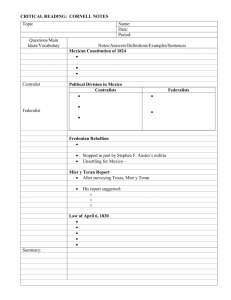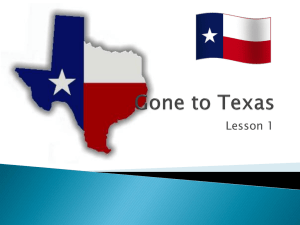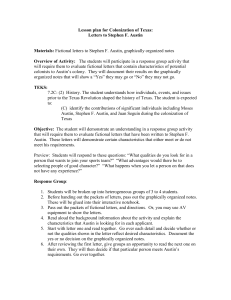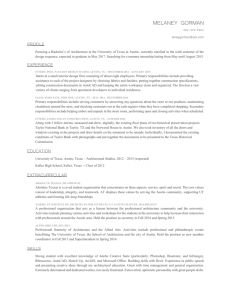Stephen Fuller Austin`s Effect on the Development of Texas
advertisement
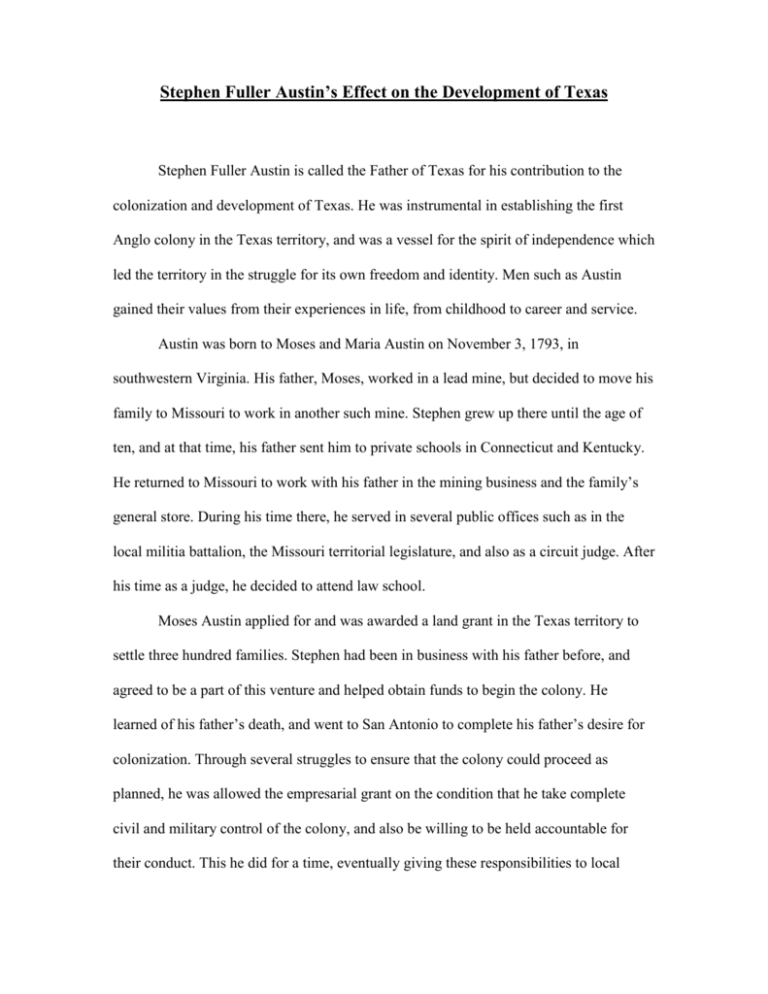
Stephen Fuller Austin’s Effect on the Development of Texas Stephen Fuller Austin is called the Father of Texas for his contribution to the colonization and development of Texas. He was instrumental in establishing the first Anglo colony in the Texas territory, and was a vessel for the spirit of independence which led the territory in the struggle for its own freedom and identity. Men such as Austin gained their values from their experiences in life, from childhood to career and service. Austin was born to Moses and Maria Austin on November 3, 1793, in southwestern Virginia. His father, Moses, worked in a lead mine, but decided to move his family to Missouri to work in another such mine. Stephen grew up there until the age of ten, and at that time, his father sent him to private schools in Connecticut and Kentucky. He returned to Missouri to work with his father in the mining business and the family’s general store. During his time there, he served in several public offices such as in the local militia battalion, the Missouri territorial legislature, and also as a circuit judge. After his time as a judge, he decided to attend law school. Moses Austin applied for and was awarded a land grant in the Texas territory to settle three hundred families. Stephen had been in business with his father before, and agreed to be a part of this venture and helped obtain funds to begin the colony. He learned of his father’s death, and went to San Antonio to complete his father’s desire for colonization. Through several struggles to ensure that the colony could proceed as planned, he was allowed the empresarial grant on the condition that he take complete civil and military control of the colony, and also be willing to be held accountable for their conduct. This he did for a time, eventually giving these responsibilities to local government officials. His focus was the development of the colony lands, and to do this, he needed more colonists to come, settle and work those lands. The Law of April 6, 1830, was implemented to slow or even stop immigration from the United States. This law stood in direct opposition to his own goals for colonization and prosperity, so he worked successfully to have it repealed in 1833. During the period between the passage and repeal of the law, several disturbances, such as the uprising at Anahuac, occurred. Santa Anna was at this time in a struggle to take control of Mexico, and Stephen F. Austin sided with him. Austin, thinking that his support for Santa Anna would win him favor in his quest to create a state government for Texas, was sadly surprised when he learned that would not happen. He sent a letter urging his colonists and fellow Texans to continue to prepare for statehood. His letter was intercepted by Santa Anna’s men, and he was imprisoned until July 1835, a total of 28 months. Upon his return, he discovered that the Texans were calling for a convention to discuss independence from Mexico. After the Texas Revolution began, he commanded the volunteer militia and led them against the Mexican army at San Antonio. Following the war, he served as a commissioner to the United States and ran unsuccessfully for President of the Republic of Texas. He ultimately accepted the office of Secretary of State. He died on December 27, 1836, at the age of forty-three. It is clear that Stephen F. Austin was motivated to colonize Texas both by the wishes of his father and his desire to be a successful businessman. He was well suited to do this based on his training in law, his early public service in the judiciary and the military, and also by his experience in business while working with his father as the manager of mines and running the family general store. His efforts to be successful and profitable helped Texas to become an independent state, although patriotism may not have been what motivated him. Regardless of his personal reasons for colonizing and developing Texas as an independent territory, his beliefs and actions helped shape Texas as we know it today. Stephen F. Austin’s efforts prior to and during the Texas Revolution are similar to those of Samuel Adams during the American Revolution. Both Adams and Austin were businessmen who were in the new territories to practice business and personal beliefs as they believed. Two beliefs both men shared were that taxes should be limited and for specific purposes, and that government intervention in business and daily life should be limited. Both were extremely committed to these beliefs, and both were willing to rebel against any authorities that threatened their lives, liberty or the freedom to pursue happiness. Another similarity between these two early leaders is that they took direct actions to further their causes, and the motivation may have been just as much financial as patriotic. Stephen F. Austin would make a great leader in today’s society. He is similar to former President George W. Bush, a strong contemporary leader, in several ways. Both were businessmen who knew that involvement in government would help their businesses prosper. Austin and Bush had at least some patriotic feelings and a desire to not simply profit, but invest their time and energies into cause that would served the better interests of the majority of the population. Finally, both were willing to put themselves in positions that made them very unpopular with certain people for the greater good of the people they served. Based on these similarities, I feel that Stephen F. Austin would make a good leader in today’s world. He had the right mix of political and business savvy that would make him an effective manager and leader for the United States.



